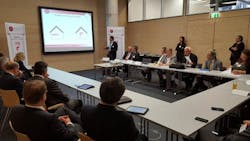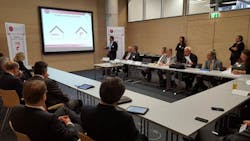FieldComm Group describes role in the future of process automation
FieldComm Group, conducting a press briefing at the 2015 ACHEMA Fair in Frankfurt, Germany, on Wednesday, June 15, described its role as a "hub of collaboration" in the new era of digital communication and integration technology for the global process automation market.
According to FieldComm Group's mission statement, the new organization was established to develop, manage and promote global standards for integrating digital devices into automation system architectures while protecting existing investments in the HART and FOUNDATION Fieldbus communication technologies.
President and CEO Ted Masters outlined FieldComm Group's objectives to trade publication editors and industry analysts attending the ACHEMA event. "The HART Communication Foundation and Fieldbus Foundation have operated similarly in their roles, and their technologies complement each other around the common goal of helping users automate to leverage real-time digital data from field devices in their plants," Masters said. "FieldComm Group was formed by combining these former foundations to create a new entity, which provides a home for their technologies. Although 'Group' replaces 'Foundation' in the new organization, the HART and FOUNDATION Fieldbus core technologies and branding remain and will be enhanced. All existing registration marks and identifications will also be retained."
He added, "Going forward, we will become the home of Field Device Integration (FDI) technology and lead its adoption as the integration standard for process automation."
Masters indicated there are many strategic advantages to automation end users, suppliers and other industry stakeholders working together based on a unified message. Additional benefits will result from leveraging combined resources to enable improvements in quality, consistency and efficiency across technologies, while replacing the duality of administrative duties.
Masters emphasized the goal of FieldComm Group is to create an open environment by partnering with industry peers around the world. "In addition to serving as the home for HART, FOUNDATION Fieldbus and FDI solutions, the Group provides a venue for all companies and associations serving the process automation market to share thought leadership. Culturally, we are receptive to collaborating with leading technologies outside of our organization to find common ground for the betterment of the industry. FDI is a giant step in this effort with international standards organizations such as Profibus International, OPC and FDT Group, and ISA100 already working together. Participation through FieldComm Group Working Groups will also help to standardize the user experience with intelligent device management."
The FieldComm Group structure combines executive strategy and direction at the board level with efficient execution and coordination around the globe. The board consists of the combined leadership of the legacy foundations and adds a Strategic Technology Committee to provide guidance from a diverse group of technical experts in leading companies.
Maintaining headquarters in Austin, Texas, USA, the organization will also coordinate marketing functions in different areas of the world to promote the message of automation integration and digital information, as well as drive industry adoption of FDI technology.
Masters explained FieldComm Group's vision for the future: "In the era of ‘Internet of Things,' there is no analog—only digital data exists. The value of digital data accessed through various hosts and systems is exciting, and is transforming our everyday lives. Nearly all devices are becoming connected and accessed for various types of new use cases. But as the ‘Industrial Internet of Things,' or IIoT, becomes more complicated, users will have many more requirements to keep their plants safe and mission-critical processes reliable. The protocols of FieldComm Group understand the critical needs of process automation users and build robust standards around these special requirements."
Masters stressed that the new, emerging integration standard across all process automation protocols will be FDI, which will simplify the lives of end users and Group members alike. End users will benefit from the fact that all host systems follow the same standard, with vendors providing only a single device package per instrument type regardless of the host. Overall, the FDI solution will simplify workflows, minimize integration effort, reduce frustration, and protect asset investments.
Concluding the briefing, Masters predicted improved solutions for digital integration would enable process industry organizations to use actionable intelligence to enhance decision-making, and thus realize greater operational and business value. "We believe the task of capturing automation technology benefits starts with connecting to data, integrating it into systems and hosts, and, ultimately, delivering the intelligence to applications where users can make better decisions to optimize their operations," he said.
About the Author
FieldComm Group
FieldComm Group

Leaders relevant to this article:


